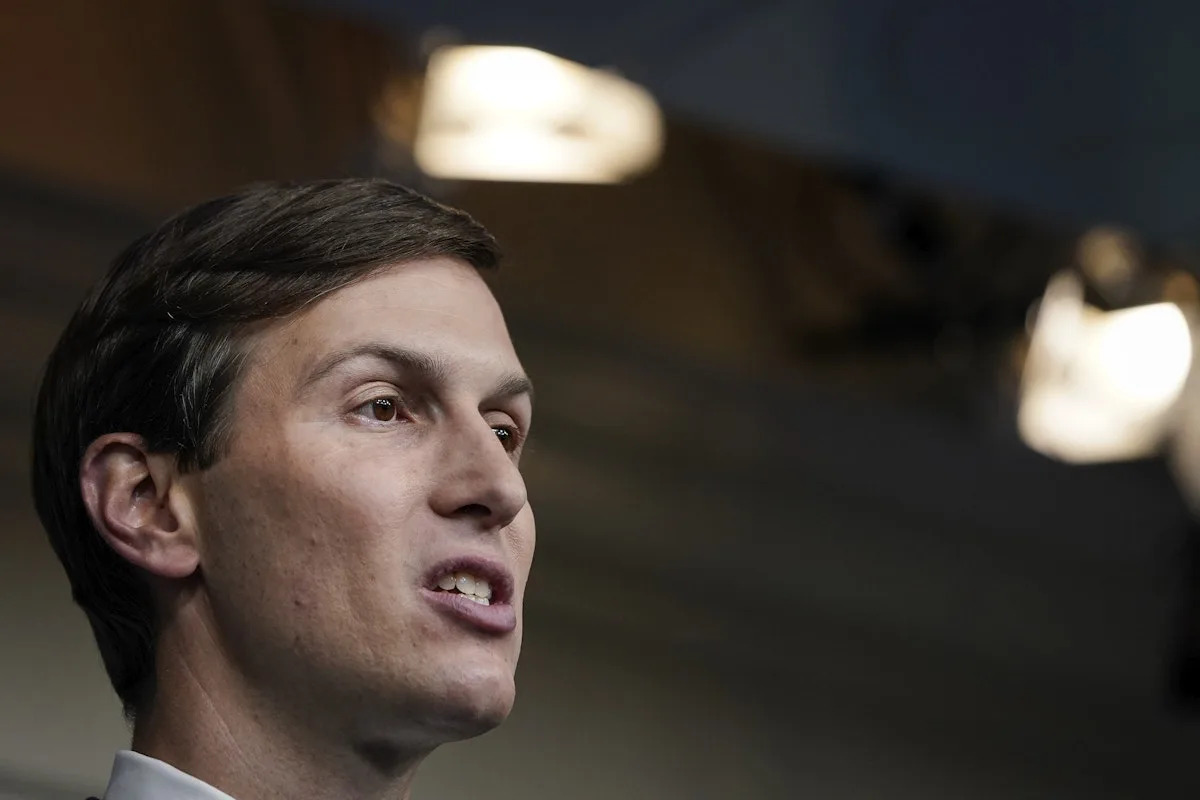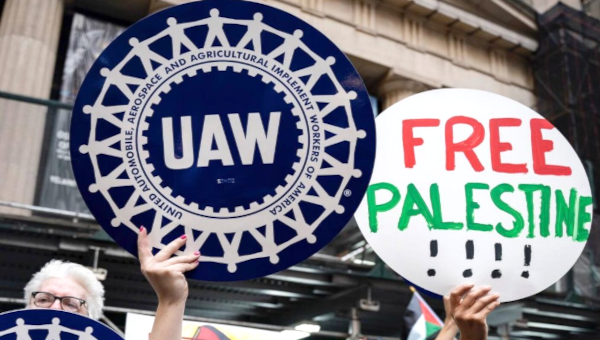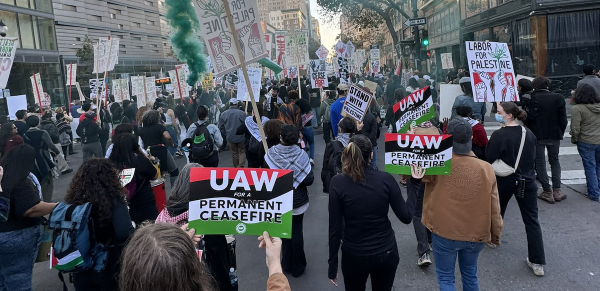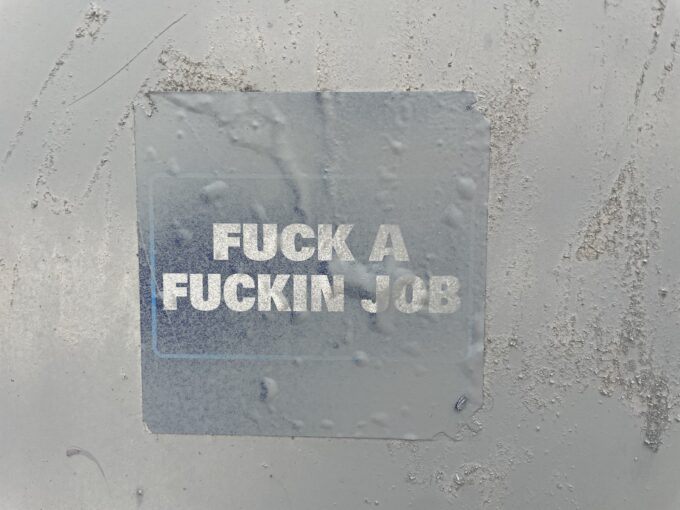Charles R. Davis
Wed, June 12, 2024

Jared Kushner John Lamparski/Getty Images
Based on his prior experience and demonstrated abilities, Jared Kushner never should have landed a job in the White House. Before joining the Trump administration, Kushner was best known as his father’s son — a real estate mogul and disbarred attorney who gifted his child control over the family’s portfolio after being convicted of multiple felonies — whose greatest accomplishment was purchasing a New York City skyscraper for $1.8 billion just months before the housing market crashed, slashing the property's value in half.
To be fair, Kushner made the best of his time in public service and appears to have turned it all around. Although he did not achieve peace in Israel and Palestine, Kushner was able to establish strategically important friendships with future benefactors in the Persian Gulf, a region he visited no fewer than 10 times on the taxpayer’s dime. A day before the January 6 insurrection, he was in Saudi Arabia for an event marking the restoration of relations between the kingdom and its rival, Qatar.
Out of office two weeks later, Kushner started up an investment firm, Affinity Partners, that quickly attracted big-time investors from the Middle East, despite the 43-year-old owner’s lack of experience running such an operation and a Google-able record of botching his only major investment decision.
As The New York Times reported in April, Kushner’s investment fund, valued at $3 billion, “is financed almost entirely from overseas investors with whom he worked when he served as a senior adviser in the Trump White House.”
Some two-thirds of that money has come from Saudi Arabia’s state-run Public Investment Fund, whose own advisers deemed Kushner’s fund “unsatisfactory in all aspects” only to be overruled by a board that includes Crown Prince Mohammed bin Salman, the man who ordered the killing of U.S.-Saudi journalist Jamal Khashoggi when Trump was in office and who Kushner today describes as a “visionary leader.” The other third? Much of it reportedly comes from other sovereign wealth funds run by the likes of Qatar and the United Arab Emirates.
That arrangement — Kusner receiving billions of dollars from friends he made as a government employee — has attracted scrutiny from Democrats and watchdog groups, who suspect that Charles Kushner’s son (turned Ivanka Trump’s husband) might be doing so well for reasons that are not entirely above board.
In a letter sent Wednesday, Senate Finance Chairman Ron Wyden, D-Ore., demanded that Kushner and company answer questions about their relations with foreign powers and suggested that what he knows so far points to their investments being part of an influence operation.
“Mr. Kushner’s limited track record as an investor, including his nonexistent experience in private equity or hedge funds, raise questions regarding the investment strategy behind the seeding investments and lucrative compensation that Affinity received from the Saudi PIF and other sovereign wealth funds,” Wyden wrote in the letter, addressed to Affinity Partners’ chief financial officer, Lauren Key. In addition to the investments themselves, Kushner’s firm charges a 2% fee to manage the states’ assets, generating at least $80 million from the Saudis alone.
It all adds up to “an appearance that Affinity’s investors are motivated not by commercial interests of seeking a return on investment,” Wyden wrote, “but rather by strategic considerations of foreign nationals seeking to funnel money to U.S. individuals with personal connections to former President Trump.”
Since being awarded billions by governments he worked with — Kushner arranged it so Trump’s first state visit was to Saudi Arabia — the former president’s son-in-law has used at least some of the money to pursue projects that Trump himself was interested in. Earlier this year, Kushner scored a major real estate deal in Belgrade, Serbia, under which Affinity Partners will have the exclusive rights to build a luxury compound on the site of a former army headquarters that was bombed by NATO in 1999. Trump had wanted to build a hotel on the same site, where Kushner has agreed to finance a memorial on behalf of the pro-Russia Serbian government that will mark the NATO campaign, which came as Belgrade’s forces were committing war crimes in neighboring Kosovo.
Virginia Canter, former chief ethics counsel for the Treasury Department and now an attorney with the watchdog group Citizens for Responsibility and Ethics in Washington, said an investigation of Kushner is not just “long overdue” but “vital for our national security.”
“It’s pretty apparent that he made and was involved in decisions that were unusually favorable to the Saudis and then he turned around, within weeks of leaving the White House, and was engaging in negotiations with them to obtain a $2 billion investment,” Canter told Salon. “It just raises all kinds of national security concerns for a former government official at that level – a former White House official — who never qualified, legitimately, for a security clearance.”
Want a daily wrap-up of all the news and commentary Salon has to offer? Subscribe to our morning newsletter, Crash Course.
Even before he left office, there were concerns about Kushner’s ties to sketchy interests. He was indeed denied a security clearance, The New York Times reported, after officials “raised questions about this and his family’s real estate business’s ties to foreign governments and investors”; he only obtained one after his father-in-law intervened. While in government, and following the murder of Khashoggi inside of Saudi Arabia’s Turkish embassy, Kushner, by then on a first-name basis with the Saudi leader who ordered the killing, “became the prince’s most important defender in side the White House,” per the Times.
“Every action he took seemed driven by what was going to come after he left office,” Canter said, noting that Kushner’s Trump-ordered security clearance granted him access to valuable, top-secret information. While he’s not the first former government official who has sought to cash in, Kushner is one of the few to completely disregard the traditional cooling off period (the other: former Trump Treasury Secretary Steven Mnuchin, whose investment firm is also backed by Riyadh).
“It’s one of the most egregious situations I’ve ever seen in decades of working in the federal government as an ethics official,” Canter said. “It appears to be a payoff as much as a potential investment,” she said, and also something of a purchase: buying Trump’s continued support for the Saudi government, which has also paid the former president millions of dollars to host its Liv Golf events. By enriching Kushner, and consequently Trump’s daughter, Ivanka, the Saudis have increased the potential cost, personally, for ever breaking with them politically.
“That,” Canter said, “may be a way of keeping Trump, in or out of office, on the Saudi side.”
Opinion
Democrats Are Finally Coming for Jared Kushner and His Shady Firm
Talia Jane
Wed, June 12, 2024

Jared Kushner’s Saudi Arabia–funded investment firm is finally being seriously examined. Senate Democrats have launched an investigation into Kushner’s firm, Affinity Partners, seeking information about the company’s investments—after it received $2 billion of its $2.5 billion in investments from Saudi Arabia.
Senate Finance Committee Chair Ron Wyden is leading the investigation, noting the peculiarities of nepobaby Kushner’s involvement in business dealings he has next to no experience doing. In a letter Wednesday asking Kushner’s firm to respond to queries about its investors, Wyden wrote:
Mr. Kushner’s limited track record as an investor, including his nonexistent experience in private equity or hedge funds, raise questions regarding the investment strategy behind the seeding investments and lucrative compensation that Affinity received from the Saudi PIF and other sovereign wealth funds.
Virginia Canter, former Treasury Department chief ethics counsel, told Salon that Kushner’s shady business dealings with Saudi Arabia, so soon after he and his father-in-law left the White House, raise serious national security concerns. “It’s one of the most egregious situations I’ve ever seen in decades of working in the federal government as an ethics official,” she said. “It appears to be a payoff as much as a potential investment.”
Kushner’s firm launched in 2021 and immediately received a majority of its funds from Saudi Arabia’s crown prince, with a whopping 99 percent coming from foreign sources. Kushner defended the flood of cash by pointing out that Crown Prince Mohammed bin Salman’s fund also invests in Nintendo, Uber, and Microsoft—which is more of an insult to those companies than it is a vouch for Kushner.
“The Saudi PIF’s decision to invest $2 billion in Affinity so soon after Kushner’s departure from the Trump White House raises concerns that the investment was a reward for official actions Kushner took to benefit the Saudi government, including preventing accountability for the Saudi government ordering the brutal murder of journalist and American citizen Jamal Khashoggi,” Wyden wrote.
In 2018, MBS oversaw the brutal assassination of Washington Post journalist Jamal Khashoggi. Trump’s White House paid no mind to the murder, instead releasing a shocking statement expressing support for Saudi Arabia and sowing doubt that MBS ordered Khashoggi’s murder, despite a CIA analysis finding that was certainly the case. Trump himself has curious ties to MBS, which during his presidency raised concerns of foreign influence.
This isn’t the first time Congress has sought answers about Kushner’s firm. In 2023, the stench of corruption was so putrid, Congress subpoenaed the company over its ties to Saudi Arabia, with even Republican James Comer saying Kushner’s Saudi blood money “crossed the line of ethics.”
Senate Democrats Launch Probe Of Foreign Payments To Jared Kushner’s Firm
Arthur Delaney
Wed, June 12, 2024

Democrats are increasing their scrutiny of Jared Kushner’s business activities.
Senate Finance Committee chair Ron Wyden (D-Ore.) asked Kushner’s firm, Affinity Partners, for details about its investors on Wednesday, including the $2 billion it received from the Saudi Arabian government’s Public Investment Fund in 2021.
“Mr. Kushner’s limited track record as an investor, including his nonexistent experience in private equity or hedge funds, raise questions regarding the investment strategy behind the seeding investments and lucrative compensation that Affinity received from the Saudi PIF and other sovereign wealth funds,” Wyden wrote.
A panel that screens investments for the Saudi sovereign wealth fund warned against investing with Kushner, given his inexperience in finance, but the full board, led by Crown Prince Mohammed bin Salman, overruled the panel, The New York Times reported in 2022.
Kushner advised Trump on foreign affairs, guided his administration to embrace Saudi Arabia as an ally, and remained in close contact with the crown prince even after he was implicated in the dismembering of American journalist Jamal Khashoggi.
“The Saudi PIF’s decision to invest $2 billion in Affinity so soon after Kushner’s departure from the Trump White House raises concerns that the investment was a reward for official actions Kushner took to benefit the Saudi government, including preventing accountability for the Saudi government ordering the brutal murder of journalist and American citizen Jamal Khashoggi,” Wyden wrote.
Wyden’s letter asked Affinity Partners for details about its seeding investments, the investments made by the firm, as well as the fees it has received, and the amount Kushner has been paid. The company did not immediately respond to requests for comment made through its website.
Wyden’s letter represents an escalation of Democratic scrutiny of Kushner’s business activities, which have been controversial from the start. Even House Oversight Committee chair James Comer (R-Ky.), an aggressive defender of Donald Trump, said last year that he thought Kushner “crossed the line of ethics” with his Saudi deal.
Comer has overseen Republicans’ impeachment inquiry against Joe Biden, which has largely focused on business deals by the president’s son. Republicans have said he improperly traded on his father’s former position as vice president during the Obama administration.
Democrats on Comer’s committee have highlighted the millions Trump’s business received from foreign governments while he was president and also questioned Kushner’s Saudi payday. Unlike Wyden, however, House Democrats don’t have subpoena power because Democrats don’t have a majority in the chamber.
Related...
Ex-Obama Adviser Spots Jared Kushner's Corruption 'Hiding In Plain Sight'
Jamie Raskin Calls For Hearing On 'Influence Peddling' By Jared Kushner
Jared Kushner Praises 'Very Valuable' Potential Of Gaza's 'Waterfront Property'
Wyden probes Kushner firm for investment details
Lauren Irwin
Wed, June 12, 2024

Wyden probes Kushner firm for investment details
Senate Finance Committee Chair Ron Wyden (D-Ore.) launched an investigation Wednesday into former President Trump’s son-in-law, Jared Kushner, and his investment firm, Affinity Partners, over details regarding its investments in Saudi Arabia.
In a letter to Affinity Partners Chief Financial Officer Lauren Key, Wyden said its concerning that several Middle Eastern governments, including Saudi Arabia, the United Arab Emirates and Qatar, are using funds managed by the company and creating “significant conflicts of interest and potential counterintelligence risks.”
“These arrangements also raise concerns that Affinity’s exclusively foreign funded private investment funds are being exploited as a loophole by Mr. Kushner and other former U.S. government officials as a means to avoid complying with the Foreign Agents Registration Act and other U.S. laws requiring U.S. persons to disclose payments form foreign governments,” Wyden wrote in the letter.
The chair is asking for the company to provide a list of all investors in funds managed by Affinity since its inception in 2021. For each investor, Wyden asked for Affinity to disclose the amount invested in funds it manages, total amount of fees the investment firm has been paid, and the annual rates of return, as well.
Building off a report by The New York Times that found Affinity disclosed that 99 percent of its assets were attributable to non-U.S. people or entities, Wyden is asking why that is the case.
One of Wyden’s asks specifically names Kushner, requesting the company detail how much Affinity paid him from 2021 to 2023, in not only salary but bonuses, other compensation, dividends and other distributions associated with the company.
The senator also asked for a list of all the shareholders and the number of shares each person owns, among several other requests he made.
During his time in the Trump administration, Kushner oversaw Middle East policy. He secured a $2 billion investment from Saudi Arabia six months after leaving the White House and has come under criticism for the potential political influence.
Kushner has defended himself and his firm’s action about the allegations of conflict of interest.
The Hill has reached out to Affinity and the attorneys representing Kushner for comment.






